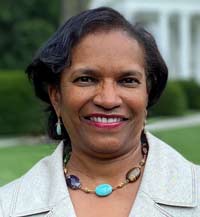Environment
Brenda Mallory, Chair of the Council on Environmental Quality, Talks Climate

Brenda Mallory is the 12th Chair of the Council on Environmental Quality (CEQ) and the first African American to hold that position. The CEQ’s mission is to coordinate the federal government’s efforts to improve, preserve, and protect America’s public health and environment.
Our Time Press spoke with Chair Mallory about the Biden Administration’s climate agenda.

OTP: Climate change is most dramatically associated with hurricanes, floods, and wildfires. Extreme Heat is also part of it. What constitutes extreme heat and who is particularly susceptible to it?
Brenda Mallory: Great question. Extreme heat is reflected in the temperatures we’re seeing recently with communities seeing temperatures of 112, 105 those are definite examples of extreme heat. But depending on what kind of work you’re doing, if you’re outside, you start to feel the effects of heat with temperatures lower than that, in the 80s or 90s. In some ways it depends on the nature of the work you’re doing.
The reason the President’s initiative is focused on heat is because we know that certain kinds of work raise these issues more than significantly than others. So people who work outside in agricultural workers, in construction or who work in facilities where the nature of the work is in high intense heat, children, senior citizens who are already vulnerable for other reasons, all of these populations are much more significantly affected by heat.
Whenever you’re talking about climate effects on low income communities and communities of color are more dramatic than we see in the broader population.
OTP: Looking at extreme heat and what the president is proposing, what kind of Aid is available for people affected by it and how would they access it.
Mallory: We’re taking a whole of government approach to addressing heat. So a number of agencies are looking at their programs and their resources and what they can make available. For example, the Department of Health and Human Services has programs that have historically been used to provide support on energy to low-income communities and we’re looking to expand what those programs can do so they would include providing cooling systems, bringing up funding for allowing people to get air conditioning for example, and not just focus on heat which is customary.
And the Environmental Protection Agency is looking at how it can use funding it received through the American Rescue Plan to help create cooling centers in schools so that in communities where folks are really feeling the effect of heat, that there would be a place people can go to get some relief.
Those are examples of what’s currently existing. But what the president has in mind is for the Department of Labor, through OSHA (Occupational Safety and Health Administration) to create a new standard, a heat standard that would help determine what is an appropriate level of exposure in the workplace to high temperatures and to look at how to better enforce the rules that currently exist about what the conditions should be for employees. Those are initiative that bring new tools to the challenge.
OTP: Today at the United Nations, President Joe Biden issued dire warnings saying the situation is at a “code red for humanity,” and “the world is fast approaching a point of no return.” What is the world he is envisioning without action on climate?
Mallory: This administration and scientists for decades have been trying to get the world to appreciate that the conditions are worsening in a way that is going to impact our daily lives. The storms and extreme weather events that we’re seeing are occurring with more frequency and more intensity are ever present examples of what that looks like.
The whole reason the administration is really focused on having the climate agenda takes such priority in the work that we’re doing, is making sure we actually make some progress in this decade.
This decade will put us in a position where some of the worst circumstances can be avoided.
If we don’t respond to the challenge in this decade, it obviously just gets harder and harder.
I myself am an optimist so a never think about giving up entirely, no matter what you’re dealing with, you do the best you can for that moment. But we believe this decade is the most important period for us to actually make progress on addressing climate change.
OTP: Anything else you’d like to say regarding environment pollution?
Mallory: One of the reasons it’s a tremendous privilege to work in this administration is because we’re prioritizing climate change and environmental justice and the intersection of those two things. One of our priorities I’ve been working very closely with the staff on is the initiative we call Justice 40, which is the president’s commitment to basically ensure that 40% of the benefits from climate and infrastructure related investments go to communities of color and low income communities. And that actually is exciting to see how we focus on areas and communities that have for so long been disinvested in, so that’s an area I’m very excited to be here to work on.

